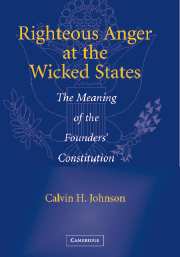Book contents
- Frontmatter
- Contents
- Acknowledgments
- Frequently Cited Sources
- Introduction
- PART ONE THE NECESSITY OF THE CONSTITUTION
- PART TWO LESS CONVINCING FACTORS
- 8 The Modest and Mercantile Commerce Clause
- 9 Creditors, Territories, and Shaysites
- 10 Hamilton's Constitution
- PART III THE SPLIT AND THE END OF THE CONSTITUTIONAL MOVEMENT
- Concluding Summary
- Index
8 - The Modest and Mercantile Commerce Clause
Published online by Cambridge University Press: 27 July 2009
- Frontmatter
- Contents
- Acknowledgments
- Frequently Cited Sources
- Introduction
- PART ONE THE NECESSITY OF THE CONSTITUTION
- PART TWO LESS CONVINCING FACTORS
- 8 The Modest and Mercantile Commerce Clause
- 9 Creditors, Territories, and Shaysites
- 10 Hamilton's Constitution
- PART III THE SPLIT AND THE END OF THE CONSTITUTIONAL MOVEMENT
- Concluding Summary
- Index
Summary
The Constitution gives Congress the power to “regulate Commerce with foreign Nations, and among the several States, and with the Indian tribes.” Contemporaries listed regulation of commerce as one of the Constitution's major purposes. Indeed, the commerce clause is even now said to be a “strong impetus for calling the Constitutional Convention.” A review of the historical record does not support that view. Regulation of commerce is best seen as a modest, even trivial power. Under the best understanding, it contributed little to the adoption of the Constitution.
“Regulation of commerce” was sometimes a synonym for nationalizing the state imposts to give Congress a source of revenue to restore the public credit. Nationalizing the impost was indeed important. Federal power over imposts, however, is given by the tax clause, the first clause of the powers of Congress, so that the power to regulate commerce does not add anything for tax. Other than tax, none of the programs espoused at the time under the cover of “regulation of commerce” ever amounted to much.
To understand words of a historical document, one must first understand the core programs that words were written to further. We can understand a vague and malleable phrase like “regulation of commerce” only by seeing through the words to look at the programs that lie under the cover of the phrase. When the Constitution came into effect, Congress chose not to adopt the nontax programs previously mentioned under the words “regulation of commerce” even with the constitutional authorization.
- Type
- Chapter
- Information
- Righteous Anger at the Wicked StatesThe Meaning of the Founders' Constitution, pp. 189 - 201Publisher: Cambridge University PressPrint publication year: 2005



